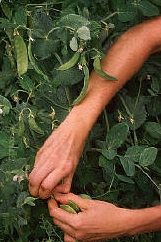
Harvesting Vegetables
Harvesting Vegetables
by Jackie Carroll
 Commercial vegetable growers, wholesalers and retailers are experts at selecting the optimum harvest time and storage conditions to ensure that the vegetables you find in the grocery store will have the longest possible shelf life. They do an excellent job of ensuring that the grocery store produce department is continually stocked with the freshest vegetables possible, even when the grower is thousands of miles from the consumer. The only problem with the system is that the optimum harvest time for a long shelf life is not always the optimum time for the best flavor.
Commercial vegetable growers, wholesalers and retailers are experts at selecting the optimum harvest time and storage conditions to ensure that the vegetables you find in the grocery store will have the longest possible shelf life. They do an excellent job of ensuring that the grocery store produce department is continually stocked with the freshest vegetables possible, even when the grower is thousands of miles from the consumer. The only problem with the system is that the optimum harvest time for a long shelf life is not always the optimum time for the best flavor.
Some people swear that once the bloom falls off the end of the squash, it's past it's prime. These infant squash aren't available at the grocery store because at this stage they bruise easily and have a shorter shelf life than squash left on the vines until the skin toughens. Some vegetables (such as tomatoes) are picked long before their prime and ripen in storage facilities rather than on the vine.
The only way to experience vegetables at their prime is to grow them yourself. For best results, harvest your vegetables the day you plan to eat them, preferably early in the morning. Sprinkle them lightly with water and store them in a cool place until you're ready to prepare them.
Some vegetables, such as parsnips, carrots and potatoes, keep well in the ground until needed. Others have a short harvest window and should be picked promptly when ripe. Invest in a good kitchen garden cookbook with a variety of recipes for each vegetable to prevent monotony when you find yourself harvesting the same vegetables for several consecutive days.
Here are some guidelines to help you decide when to harvest your vegetables:
| VEGETABLE | HARVEST TIME |
| Beans, Snap | Harvest before you can feel the outline of the individual beans. If left too long, shell the beans and discard the pod. |
| Beets | For greens, harvest the inner leaves while young and tender. Roots should be harvested when no larger than a tangerine. |
| Broccoli | Harvest broccoli while the head is still tight. Once the buds begin to spread it will soon flower. |
| Cabbage | Heads are ready to harvest when they are firm and heavy. If left too long they will split. Split heads are edible, but difficult to deal with in the kitchen. |
| Carrot | Carrots can be harvested any time. Small carrots are the sweetest, but it's best to leave them in the ground until you need them so they won't dry out. |
| Corn | Once the kernels turn a golden color they are getting too old, and by the time a dent appears in the end of the kernels they are virtually inedible. |
| Cucumber | Harvest before the seeds inside swell. |
| Eggplant | Harvest when the fruit is small and glossy. Once they loose their shine they are too old. |
| Lettuce | Baby lettuce is a gourmet treat. Harvest the leaves as needed from the outside. Once the stems begin to lengthen and the leaves begin to grow up, the plant is getting ready to bolt and will be bitter. |
| Muskmelon | Pick up the melon. If the vine falls off it's ready. |
| Onion | Onions can be harvested at any stage. When the tops fall over they should be dug and dried for a day, then braided or stored in a net bag. |
| Peas | Harvest before the individual peas begin to touch inside the pods. They become starchy and tasteless if left too long. |
| Pepper | Harvest any time, depending on individual taste. |
| Potatoes | Potatoes begin to form when the plant blooms. Soon thereafter you can harvest small new potatoes, or wait until the plants begin to die back for large potatoes. |
| Summer Squash | The younger the better. Squash left on the vine too long inhibits the production of new fruit. |
| Winter Squash | Most winter squash should be left on the vine until the bottom is a different color from the top, and the skin is hard. |
| Tomatoes | It's best to wait until the tomato is ready to eat. A tomato that is picked when is is showing any orange or red color will be superior to a supermarket tomato. |
About the Author:
Jackie Carroll is the editor of GardenGuides.com, a leading internet destination for gardening information and ideas.